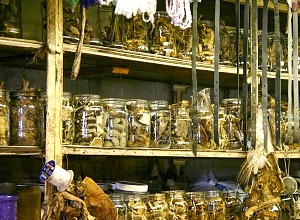As South Africa battled COVID-19 and deaths rose, many turned to traditional herbs for treatment, writes Medscape. The problem is how to bring scientific rigour into the equation.
In June 2020, Artemisia afra was in high demand on the streets of Johannesburg to treat COVID-19. The indigenous herb's silvery leaves were for sale at roadside vendors and in traditional markets. On the sides of nearby highways, people held signs for mhlonyane (A. afraisi's Zulu name) and offered bushels to passing motorists like bouquets. Between February and July, the herb, consumed for centuries to treat illnesses from colds to intestinal worms, doubled in price.
In Madagascar, in April, the country's president, Andry Rajoelina, launched Covid-Organics, a herbal concoction containing another artemisia species, A. annua, which he claimed could cure COVID-19.) As with most traditional medicine in Africa, there was no robust, peer-reviewed evidence that A. afra has any utility against any ailment, including COVID-19.
Local medical doctors and officials have cautioned the public against using the plant instead of seeking medical attention for COVID-19, and the World Health Organisation (WHO) has similarly urged people to avoid using untested medicines to treat the disease.
This has not stopped demand for A. afra – and that demand now has some mainstream health advocates calling for greater scrutiny of traditional remedies – and including submitting them to clinical trials. Whether this will come to pass is far from clear.
Despite South Africa having a large number of practicing traditional healers and millions of mostly Black South Africans who use their medicines, traditional health care practices stand well outside of mainstream health care in the country. Although there have been efforts to regulate traditional healers, their remedies, for the most part, have not been subjected to scientific scrutiny.
Medscape reports that this is in part due to South Africa's history. The report notes that there is also a long history elsewhere in the world of scientists and companies turning Indigenous knowledge into Western medicines, and many stakeholders fear that, once healers divulge their secrets and methods to expose their therapies to the rigour of clinical trials, this will happen again with South African traditional medicine.
Indeed, many herbal remedies are closely guarded secrets, intertwined with a philosophy in which health is inextricably linked with spiritual life. And unlike other ancient health care systems that rely on written texts, African healers share and preserve knowledge largely through oral tradition, so there is little record of how the medicines were made and used hundreds of years ago.
This lack of ingredient information and recorded longitudinal safety data make African traditional medicines particularly difficult to test.
But, writes Medscape, while some experts lobbying for more scrutiny of traditional medicine noted that South Africa's drug regulators have been historically antagonistic to the idea, the unprecedented COVID-19 pandemic may well be helping to change all that. "COVID has been a game changer for traditional medicine," said Nceba Gqaleni, a traditional medicines specialist at the Africa Health Research Institute in Durban, adding that the COVID-19 treatments haven't faced some of the same controversies as past traditional medicines – especially therapies for HIV/Aids.
A. afra is one of a number of herbs that the government is investigating against COVID-19. In July, officials set up the African Medicines COVID-19 Research Team, which includes scientists and traditional healers, and diverted about R15m from existing Indigenous knowledge projects to fund the collaboration. The project could lead to other research outside of COVID-19, since the country is home to 10% of the world's plant species and remains a largely untapped pharmaceutical resource.
"Clinical trials are the best and safest way" to evaluate medicines, said Francois Venter, deputy executive director of the Wits Reproductive Health and HIV Institute at the University of the Witwatersrand. The drugs are tested for safety in animals and humans, and this way of testing is widely accepted, he added. "But there are no shortcuts, they are expensive." This standardised approach, however, is at odds with the opaque and complex belief system that underpins African traditional medicines.
Historically, traditional medicines research had not been scientifically rigorous, says Salim Abdool Karim, an infectious disease epidemiologist and the chair of South Africa's Ministerial Advisory Committee on COVID- 19. "So it has given traditional medicines research a bad name. But we shouldn't let a few lapses in scientific quality put us off a fundamentally important issue." Scientists, public officials, and traditional healers all seem to agree that traditional medicines must be shown to be safe and effective. The sticking point is how this should happen.
[link url="https://www.medscape.com/viewarticle/943429"]Full Medscape report[/link]
See also from MedicalBrief’s Archives:
[link url="https://www.medicalbrief.co.za/archives/sa-traditional-medicine-researchers-examine-madagascars-cure-for-covid-19/"]SA traditional medicine researchers examine Madagascar’s ‘cure’ for COVID-19[/link]
[link url="https://www.medicalbrief.co.za/archives/who-recognises-traditional-medicine-in-developing-new-covid-19-treatments-but-cautions-against-lack-of-evidence/"]WHO recognises traditional medicine in developing new COVID-19 treatments but cautions against lack of evidence[/link]
[link url="https://www.medicalbrief.co.za/archives/who-issues-rules-for-testing-african-herbal-remedies-against-covid-19/"]WHO issues rules for testing African herbal remedies against COVID-19[/link]
[link url="https://www.medicalbrief.co.za/archives/traditional-healers-are-modernising-but-remain-unregulated/"]Traditional healers are modernising but remain unregulated[/link]

